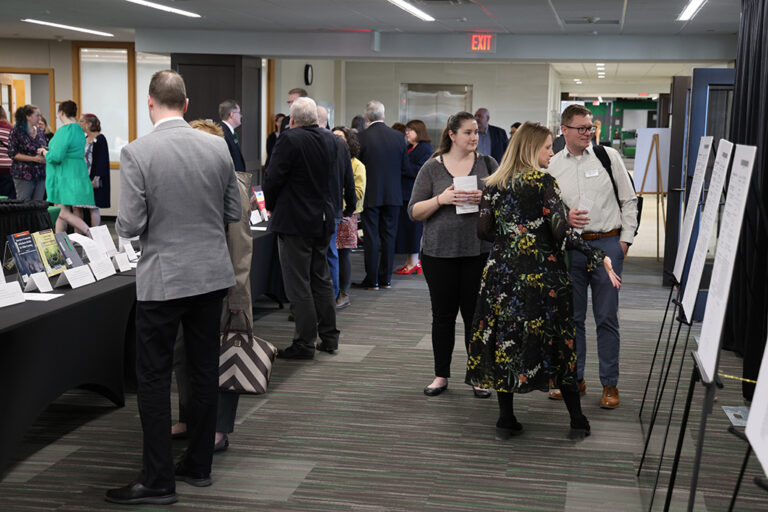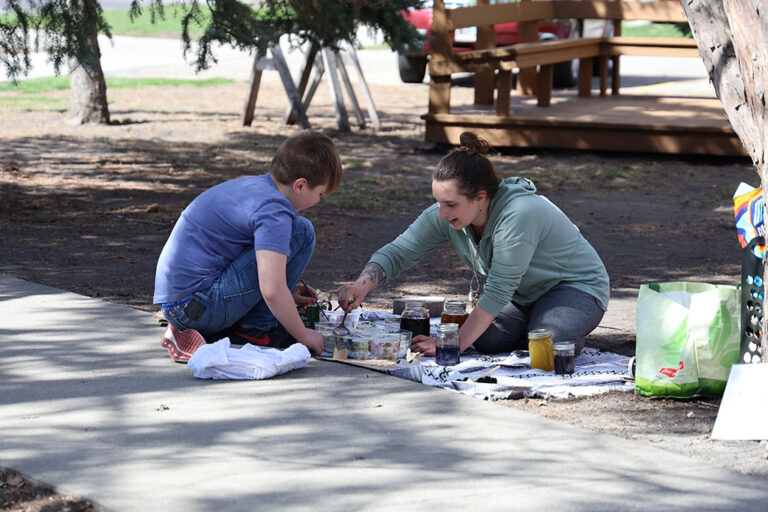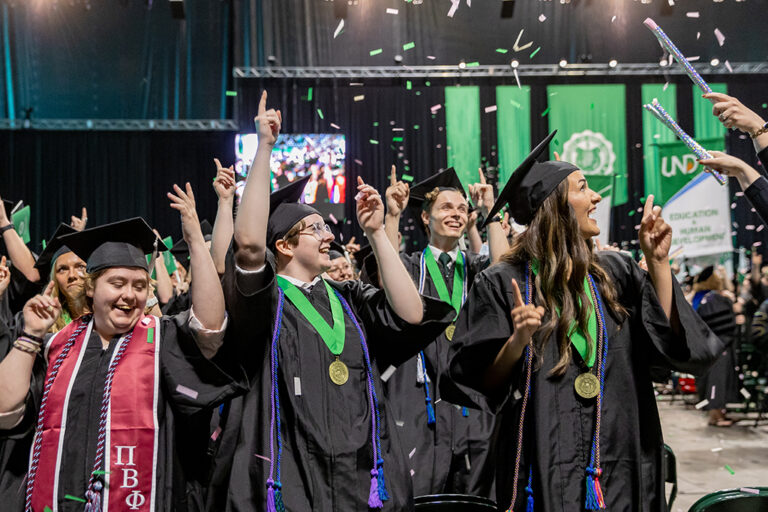Early Career Awards highlight research of budding scholars
At inaugural event, Early Career Scholars unveil especially promising research

Editor’s note: In the UND LEADS Strategic Plan, the Discovery core value calls on the University to “further empower departments and units to establish appropriate and measurable outcomes for creative activity and research.
“These outcomes should be specific to each department’s professional discipline and incorporated into the evaluation process and faculty tenure and promotion standards,” the declaration continues.
The story below, which UND Today first printed on Dec. 14, spotlights one of the University’s latest efforts to recognize faculty who are conducting especially significant research
****.
Last spring, UND’s Office of Research and Economic Development established the Early Career Scholars Program (ECSP), a project designed to kick-start the careers of researchers transitioning from Ph.D. and postdoc programs to full-time faculty.
Four interdisciplinary teams, chosen from the 12 proposals submitted to the ECSP last spring, made up the first cohort of the program. A total of seven researchers were involved; each team was made up of two researchers, while one of the researchers served on two teams.
The teams also were connected with seasoned mentors in related fields and provided with $30,000 to further develop and research their proposals for external funding and publication.
On Dec. 6, the scholars gathered at the Gorecki Alumni Center for the Early Career Awards. In front of an audience of their peers, the teams presented their findings and updates on future funding opportunities.
Interim Vice President of Research and Economic Development John Mihelich, Professor of Sociology Justin Berg and Vice Provost for Faculty Affairs Randi Tanglen delivered remarks at the start of the program, recognizing the achievements the teams made in their research.
“I want to thank you, as the participants of this program, for sharing your expertise, talents and research passions,” Tanglen said. “You are what UND needs and what the world needs right now to solve these big problems through collaboration and working together.”

Early Career Scholars share their work
Shortly after the opening comments, each team took the stage to deliver their presentations. A collaboration between faculty in the School of Law and Department of Psychology was the first to speak.
Co-principal investigators Dan Lewerenz, assistant professor at the School of Law, and Kimberly Schweitzer, assistant professor of Psychology, said they’ve received the interest of a judge on the Eighth Circuit Court of Appeals to present their research at a judicial conference.
Their project focused on “Indian status” — whether an individual is considered an “Indian” in criminal justice proceedings — which Lewerenz said has a long and complicated history in the United States.
In the study, more than 700 participants were asked to identify a defendant’s “Indian status” based on the presence or absence of stereotypical attributes. Then the participants were asked to determine guilt based on a mock trial audio and text samples.
Their study found that “Indian status” could have an influence on guilt determinations made by jurors.
The duo, under the mentorship of Professor of Sociology Daphne Pederson, plans to publish their research in addition to pursuing funding from the National Science Foundation Law and Science Grant.
The next two research topics featured an emphasis on atmospheric sciences. David Delene, research professor of Atmospheric Sciences, served as senior mentor for both groups.
Principal Investigator Marwa Majdi and Co-Principal Investigator Jared Marquis, postdoctoral research fellow and assistant professor of Atmospheric Sciences (respectively), researched the development of a machine learning technology that automatically detects the height of the cloud ceiling.
The “cloud ceiling” refers to the height from the ground to the base of the lowest layer of cloud. It’s important for the safety and efficiency of unmanned aircraft system operations, particularly given the growth of UAS use in the past decade.
The team is working to submit their proposal to the NASA Advanced Information System Technology and the Federal Aviation Administration Research Grant programs, in addition to looking at other sources of funding.
In the second atmospheric science-related presentation, Co-Principal Investigator Majdi and Principal Investigator Hallie Chelmo, assistant professor of Mechanical Engineering, presented their findings on the effect of exhaust from rockets on atmospheric composition.
Chelmo noted that soot from exhaust contains materials that absorb light and increase energy flux to Earth, which contributes to global warming. (Energy flux is the balance between incoming and outgoing energy at the top of the atmosphere.)
She also mentioned the potential for particles from exhaust to contribute to the formation of polar stratospheric clouds, which deplete Antarctic ozone.
They have submitted a proposal to the Air Force Office of Science and Research and may also submit to grant programs from the National Science Foundation and NASA.

The last presentation came from principal investigator Kumi Nagamoto-Combs, assistant professor of Biomedical Sciences, and Co-Principal Investigator Bo Liang, assistant professor of Biomedical Engineering. They were mentored by Department Chair and Professor of Biomedical Engineering Colin Combs.
Their research tested the effects of low-grade inflammation from food allergies on the brain. Through transparent windows in the skulls of mice, they used microscopes to observe brains injected with fluorescently labeled immune cells. They are interested in learning about inflammation’s effects on memory and on behavioral changes.
Nagamoto-Combs said the process of refining the experiment has been valuable, especially in finding improvements to the methodology and technology used. They plan to complete imaging for data collection and publish their research. They will also apply for a grant to use the process to look at the differences between allergic mice and a control group.
New scholars, new research
Following the first cohort’s presentations, the next cohort of the ECSP was introduced. The new projects and research teams are:
- “Learning Molecular Electronic Structure Using Physics-Informed Neural Networks”: Principal Investigator Ayush Asthana, assistant professor of Chemistry; Co-Principal Investigator Ahmed Abdelhadi, assistant professor at the School of Electrical Engineering & Computer Science; Senior Mentor Mark Hoffmann, professor of Chemistry and associate dean at the School of Arts & Sciences.
- “Geopolitical and Geo-Economics Implications on Recent Advances in Space Propulsion and Hypersonic Technologies”: Principal Investigator Francisco Del Canto Viterale, assistant professor of Space Studies; Co-Principal Investigator Marcos Fernandez-Tous, assistant professor of Space Studies; Co-Principal Investigator Chonglin Zhang, assistant professor of Mechanical Engineering; Co-Principal Investigator Brian Urlacher, professor and department chair at the Department of Political Science & Public Administration; Senior Mentor Pablo de Leon, professor and department chair at the Department of Space Studies.
- “Efficient Removal of Perfluorooctanoic Acid (PFOA) Using Magnetic Biomass-Derived Carbon Quantum Dots in Water Treatment”: Principal Investigator Mahmut S. Ersan, assistant professor of Civil Engineering; Co-Principal Investigator Mariia Goriacheva, assistant professor of Chemical Engineering; Senior Mentor Alena Kubatova, professor and department chair at the Department of Chemistry.
- “AI-Driven Advanced Nanomaterials Discovery for Biomedical Applications”: Principal Investigator Binglin Sui, assistant professor of Chemistry; Co-Principal Investigator Jielun Zhang, assistant professor at the School of Electrical Engineering & Computer Science; Senior Mentor Julia Zhao, professor of chemistry.
- “Athletic Mental Wellness: Promoting College Student-Athlete Mental Health and Well-Being”: Principal Investigator Akorede Teriba, assistant professor of Counseling Psychology; Co-Principal Investigator Radomir Ray Mitic, assistant professor of Higher Education; Senior Mentor Rachel L. Navarro, training director and professor of Counseling Psychology.
- “Development of Advanced Propulsion and Orbit Management Technologies for the Deployment and Operation of Constellation of Low Earth Orbit Satellites”: Principal Investigator Chonglin Zhang, assistant professor of Mechanical Engineering; Co-Principal Investigator Hallie Chelmo; Co-Principal Investigator Bryce Christopherson, assistant professor of Mathematics; Co-Principal Investigator Fernandez-Tous; Senior Mentor Gautham Krishnamoorthy, professor of Chemical Engineering.
Advancements for knowledge, science and humanity

Following the presentations, each of the researchers were presented with an award to commemorate their involvement in the program.
Mihelich closed the event by commenting that economic diversification research funding from last spring’s session of the North Dakota Legislature shows the importance of programs such as ECSP to the region’s economic development.
“There was true recognition from the Legislature that university research should be supported,” he said. “There is a tremendous range of projects and scholars here today, and they fit into the continuum of economic development.”
Moreover, Mihelich said that UND’s commitment to research for commercial, fundamental and creative purposes will have lasting impacts on the region.
“In the whole of our research endeavors, we’re training students. That workforce development is really important to economic diversification,” he said. “This is about what we contribute to knowledge, to science and to humanity.”
The second ECSP cohort will present their research at another event at the end of the Spring Semester, Mihelich said.
****
>> QUESTIONS OR COMMENTS about the UND LEADS Strategic Plan? Your thoughts are welcome! Please contact Angie Carpenter, UND’s director of Special Student Populations, and/or Ryan Zerr, associate vice president for Strategy & Implementation, the co-chairs of the UND LEADS Implementation Committee.
You also may offer your thoughts by visiting the UND LEADS Strategic Plan home page and clicking on the “Provide your feedback” link that you’ll find there.
Thank you for your support of the UND LEADS Strategic Plan!



